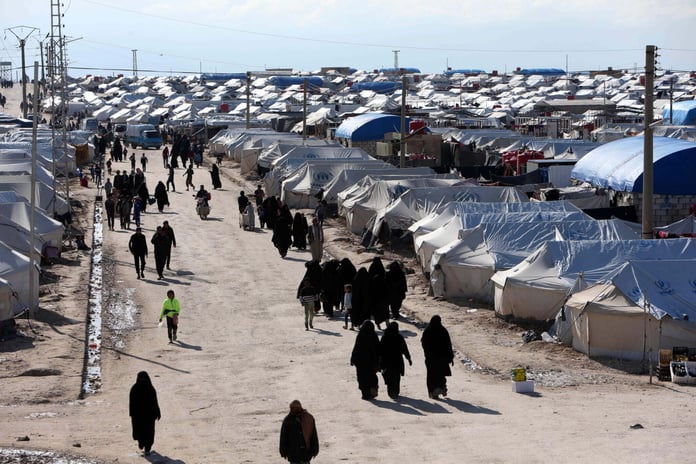
A report by Foreign Policy magazine revealed the digital world of ISIS women in the camps, and the most important topics they discuss in their conversations on the Internet, even though mobile phones are prohibited for them.
The report stressed that there are not many sources to understand the remains of ISIS women in Syria and how they think, and perhaps the most important of these sources are their conversations on the Telegram application.
According to the magazine, they created a chat room with 400 members, of whom at least 200 participate daily, and most of the conversations are in Russian. She pointed out that applications to join are not accepted until after a recommendation from an existing member.
The magazine stated that they use fake names that do not express their true names, such as “Umm Yusuf, Sumaya Uzbek, a prisoner in the world.” As for the personal pictures of their accounts, they are pictures of nature or lionesses, which they often like themselves to, or pictures of black flags and weapons.
As for the topics that they discuss two years after the defeat of the organization and the arrest, they are normal matters that do not touch on religion or the organization such as selling food, tents, clothes, jewelry, medicine, and even animals, since many women keep pets, there are a lot of messages related to raising rabbits, you may find messages Such as “Who has a male rabbit of interesting color? I’d like to borrow it for a day to breed”, as well as the desperate search for lost and stolen cats.
Hottest themes
The report emphasized that the heated discussions are often about economic issues such as food, tents and cooking stoves. Sellers are accused of setting prices too high, and although some women advocate free trade and seller selection to set the price based on demand, others point out that “religion urges helping poor women”, accusing sellers of not following Islam.
Some of them are looking for sources of income and earning money, many of them have opened businesses and used the Internet for advertising, such as children’s classes, illegal money transfers, laundry services, and children’s swimming pool rentals. There are also ads for aerobics classes, which are very popular at campers, even Kegel exercises, and ads for non-alcoholic fruit cocktails.
Topics also include talks about corruption, with leaders and supporters abroad helping women by sending money through a few women in the camp. But the women responsible for distributing the money are often accused of stealing it and neglecting the women most in need.
In addition to using these conversations for their own safety, for example, women can tell each other where the camp guards are currently so that those around them can hide their phones, and discuss which journalists and officials are in the camp and what they ask.
With time in the internment camp and money running out, crime has become an urgent problem as well. Gangs of young boys began stealing tents at night, and it became a major topic of discussion online. They often retweet news about disasters in the West, such as the California wildfires, and these posts are followed by happy and gloating comments, although the enthusiasm is much less now than in the past.
Although many of the conversations are in Russian, news from France is the most popular since a teacher was beheaded there by a Chechen immigrant.
“Badge of Honor for Jihadists”
The most serious topics that rob sharp differences between them are talking about the acceptable clothes for women in the camp, how to deal with male workers in the camp, and opinions about the possibility of repatriation, and whether certain figures from the organization are Muslim or not.
The report emphasized that over time, women become less interested in extremist topics and more interested in everyday issues. Even children who throw stones at camp guards now face more criticism than support. This may be the case either because the most extreme women have already been turned back or have managed to escape.
A report by the Guardian newspaper at the beginning of the month said that some women linked to ISIS in a detention camp in northeastern Syria met their husbands online and were smuggled out of the camp after their new husbands paid bribes.
According to the newspaper, there are women residing in al-Hol camp who meet their husbands online using social media, through accounts that show their good intentions of “jihadism”.
The newspaper says that these women solicit donations from men online, either to fund their escape attempts or improve their quality of life within the camp walls. The exact number of women who followed this method to escape the camp is still unknown, and it is believed that they number in the hundreds.
The newspaper says that the cost of leaving the camp is up to $15,000 in some cases. She points out that some marriages are no more than “virtual”, and that some men, it seems, consider having a wife in the camp as a “badge of honor on the social networks of jihadists.”
According to the newspaper, some of these “marriages” take place over the phone, and it is not usually necessary for the woman to be part of the call.
The call combines the groom with an intermediary sheikh, who recites a few verses, then announces the groom as her new guardian, before she receives a sum of money or a new phone as her dowry.
Although the virtual relationships appear to be “charitable”, the newspaper says that one of its sources has seen messages containing explicit pictures exchanged with women in the camp.











